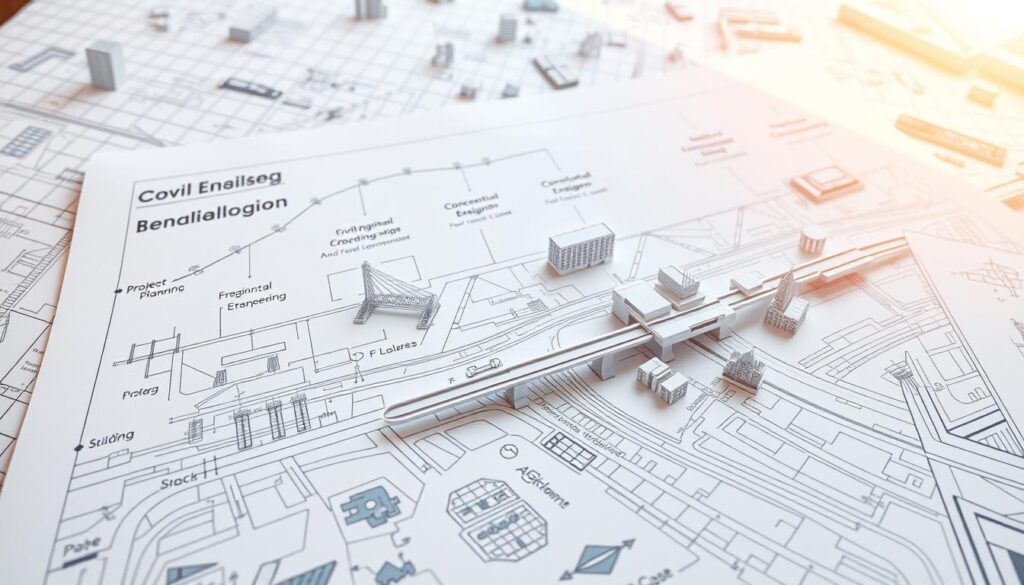The infrastructure landscape is rapidly evolving, with infrastructure consulting playing a pivotal role in shaping the future of cities and communities. Did you know that the global infrastructure consulting market is projected to grow significantly, driven by the need for sustainable and resilient infrastructure solutions?
Companies like BENEN are at the forefront of this change, providing award-winning civil engineering services that have transformed urban landscapes. With a proven track record of delivering complex projects, BENEN stands out as a trusted partner in the industry. For insights into other leading civil engineering firms, visiting resources like notable civil engineering companies can provide valuable information.
BENEN’s expertise, much like other top firms such as those listed on Snell Engineering, underscores the importance of trusted civil engineering consultancy in modern infrastructure development.
Key Takeaways
- Reliable civil engineering consultancy is crucial for infrastructure development.
- BENEN is an example of a company delivering award-winning services.
- The demand for sustainable infrastructure solutions is driving market growth.
- Trusted consultancy services are essential for complex project delivery.
- Leading firms are leveraging expertise in infrastructure consulting to innovate.
Understanding Civil Engineering Consultancy
Understanding the scope and importance of civil engineering consultancy is essential for any infrastructure project. Civil engineering consultancy firms provide critical expertise that spans various aspects of infrastructure development, from planning and design to execution and maintenance.
What is Civil Engineering Consultancy?
Civil engineering consultancy involves providing expert advice and services related to the design, construction, and maintenance of infrastructure. This can include roads, bridges, buildings, and other critical infrastructure projects. A civil engineering firm typically employs a range of professionals, including engineers, architects, and project managers, to deliver comprehensive solutions.
The role of a civil engineering consultant is multifaceted, involving not just technical expertise but also project management and coordination with various stakeholders. Their work ensures that projects are completed on time, within budget, and to the required quality standards.
Importance of Civil Engineering in Infrastructure
Civil engineering plays a pivotal role in infrastructure development. It is the backbone of creating and maintaining the built environment, ensuring that structures are safe, functional, and sustainable. The importance of civil engineering in infrastructure can be seen in several areas:
- Designing and constructing critical infrastructure such as roads, bridges, and public transportation systems.
- Ensuring that buildings and other structures can withstand natural disasters and other external factors.
- Implementing sustainable practices and materials in construction projects.
By focusing on these areas, civil engineering consultancies contribute significantly to the development of resilient and sustainable infrastructure.
Key Roles of a Civil Engineering Consultant
A civil engineering consultant is responsible for a wide range of tasks, including:
- Conducting site investigations and assessments to determine the feasibility of a project.
- Designing and developing project plans, including structural engineering solutions.
- Overseeing the construction process to ensure compliance with plans and regulations.
Stanley Consultants, for example, delivers tailored engineering solutions for various industries, including education and healthcare, addressing energy efficiency, sustainability, and resilient infrastructure. Their expertise highlights the diverse applications and importance of civil engineering consultancy in modern infrastructure development.
In conclusion, civil engineering consultancy is a vital component of infrastructure projects, providing the necessary expertise to ensure that projects are executed efficiently and effectively. By understanding the role and importance of civil engineering consultancy, clients can better appreciate the value that these services bring to their projects.
Services Offered by Civil Engineering Consultancies
Infrastructure consulting firms, like BENEN, offer comprehensive services that span multiple disciplines within civil engineering. Their expertise encompasses a broad range of services critical to the successful execution of infrastructure projects.
Project Management
Effective project management is crucial in civil engineering, ensuring that projects are completed on time, within budget, and to the required quality standards. Civil engineering consultancies provide expert project management services, overseeing all aspects of a project from inception to completion. For insights into the role of civil engineering consultants, visit https://www.efdouglasandassociates.com/what-do-civil-engineering-consultants-do/.
Structural Engineering Services
Structural engineering services are a cornerstone of civil engineering consultancies, involving the design, analysis, and inspection of structures to ensure they can withstand various loads and stresses. BENEN’s structural engineering services include detailed design and analysis, ensuring that structures are safe, durable, and meet regulatory requirements.

Environmental Assessments
Civil engineering projects often require thorough environmental assessments to identify potential impacts on the environment and to develop strategies for mitigating these effects. BENEN conducts comprehensive environmental assessments, adhering to regulatory standards and best practices.
Geotechnical Engineering
Geotechnical engineering is another vital service provided by civil engineering consultancies, involving the study of the earth’s physical properties and their interaction with engineering structures. BENEN’s geotechnical engineering services include site investigations, soil testing, and foundation design, ensuring that structures are built on stable ground.
For guidance on managing civil engineering projects, including the integration of these services, refer to resources like https://worldcivilsociety.com/how-to-manage-a-civil-engineering-project/, which offer valuable insights into best practices in project management.
Why Choose Our Civil Engineering Consultancy?
Our civil engineering consultancy is built on a foundation of expertise, quality, and innovation. With a team of highly experienced and licensed professionals leading our consultancy, we are well-equipped to handle complex civil engineering projects.
Expertise and Experience
At BENEN, our leadership team is comprised of talented individuals with extensive experience in civil engineering. Their expertise ensures that our clients receive the best possible solutions for their projects. For insights into choosing the right civil engineering consultant, visit this resource.
Commitment to Quality
We are committed to delivering high-quality services that meet the unique needs of our clients. Our team works diligently to ensure that every project is executed with precision and care, reflecting our dedication to excellence in urban development advisory.
Innovative Solutions
Innovation is at the heart of our consultancy. We continuously seek new and improved methods to tackle the challenges of civil engineering, ensuring that our clients benefit from the latest advancements in the field.
The Civil Engineering Design Process
From initial consultation to implementation, the civil engineering design process is a comprehensive journey that ensures the successful delivery of infrastructure projects. This process is pivotal in transforming conceptual ideas into tangible structures that meet the needs of communities.
Initial Consultation and Needs Assessment
The first step in the civil engineering design process involves an initial consultation to understand the client’s needs and project requirements. This phase is crucial for identifying potential challenges and opportunities, allowing for a tailored approach to the project. For instance, the design-build team for the Upper Banner project listened to concerns and was very responsive, setting a positive tone for the entire project.

Conceptual Design Phase
Following the initial consultation, the conceptual design phase begins, where preliminary designs are developed based on the project’s objectives and constraints. This stage involves exploring various design alternatives and selecting the most viable option. Effective civil engineering services play a critical role in this phase, ensuring that the chosen design is both feasible and innovative.
Detailed Design and Documentation
The detailed design and documentation phase involves refining the selected design concept into a comprehensive and detailed plan. This includes creating precise drawings, specifications, and documents necessary for construction. The goal is to provide clear, actionable instructions for the construction team, minimizing the risk of misinterpretation or errors.
Implementation and Oversight
During the implementation and oversight phase, the civil engineering consultancy oversees the construction process, ensuring that the project is executed according to the detailed design and specifications. This involves monitoring progress, addressing any issues that arise, and coordinating with contractors and other stakeholders. The Upper Banner project’s success was largely due to the effective collaboration and oversight during this phase.
| Phase | Description | Key Activities |
|---|---|---|
| Initial Consultation | Understanding client needs and project requirements | Needs assessment, project scoping |
| Conceptual Design | Developing preliminary designs | Design alternative exploration, feasibility studies |
| Detailed Design | Refining the design into a comprehensive plan | Creating detailed drawings and specifications |
| Implementation and Oversight | Overseeing the construction process | Monitoring progress, issue resolution, stakeholder coordination |
Industry Applications of Civil Engineering Consultancies
BENEN’s civil engineering consultancy services cater to a diverse range of industries, from residential development to environmental projects. With a strong foundation in infrastructure consulting and transportation planning services, BENEN’s expertise is pivotal in shaping modern infrastructure.
Residential Development Projects
Residential development projects require meticulous planning and execution. BENEN’s team provides comprehensive services, including site analysis, design, and project management, ensuring that residential projects are completed on time and within budget.
Commercial Infrastructure Projects
For commercial infrastructure, BENEN offers transportation planning services and structural engineering solutions. Their expertise helps in creating efficient and sustainable commercial spaces that meet the needs of businesses and their clients.
“BENEN’s approach to civil engineering is holistic, considering not just the immediate needs of a project but its long-term impact.”
Public Works Initiatives
Public works initiatives, including roads, bridges, and public buildings, are critical to community development. BENEN’s civil engineering consultancy plays a crucial role in these projects, providing innovative solutions and ensuring compliance with regulatory standards.
Environmental Projects
Environmental projects require a delicate balance between development and conservation. BENEN’s team is experienced in handling environmental assessments and implementing sustainable practices in their projects, minimizing environmental impact.
| Project Type | Services Offered | Benefits |
|---|---|---|
| Residential Development | Site analysis, design, project management | Timely completion, budget adherence |
| Commercial Infrastructure | Transportation planning, structural engineering | Efficient, sustainable commercial spaces |
By leveraging their expertise in infrastructure consulting and transportation planning services, BENEN continues to drive progress across various industries, delivering projects that are both functional and sustainable.
The Importance of Regulatory Compliance
Regulatory compliance is a cornerstone of successful civil engineering projects, ensuring that developments are not only safe and functional but also adhere to local, state, and federal regulations. At BENEN, a certified Disadvantaged Business Enterprise (DBE) and Small Business Enterprise (SBE) in California, we understand the significance of navigating the complex regulatory landscape.
Understanding Local Regulations
Local regulations play a crucial role in shaping civil engineering projects. These regulations can vary significantly from one jurisdiction to another, making it essential for civil engineering consultancies to have a deep understanding of the local regulatory environment. This includes familiarity with zoning laws, building codes, and environmental regulations.
- Familiarity with local zoning laws and land-use regulations
- Understanding of building codes and standards
- Knowledge of environmental regulations and permitting requirements
Navigating Permitting Processes
Navigating the permitting process is a critical aspect of regulatory compliance in civil engineering projects. The permitting process can be complex and time-consuming, involving multiple stakeholders and regulatory bodies. Effective navigation of this process requires a thorough understanding of the necessary permits, documentation, and timelines.
Key steps in navigating permitting processes include:
- Identifying the necessary permits and approvals required for the project
- Preparing and submitting detailed permit applications
- Engaging with regulatory bodies to address any concerns or issues that arise during the permitting process
Importance of Safety Standards
Safety standards are a fundamental component of regulatory compliance in civil engineering. Adhering to safety standards not only ensures the well-being of workers and the public but also helps to prevent costly delays and reputational damage. At BENEN, we prioritize safety in all our projects, ensuring that our designs and implementations meet or exceed relevant safety standards.

By understanding local regulations, navigating permitting processes effectively, and adhering to safety standards, civil engineering consultancies like BENEN can ensure regulatory compliance and deliver successful projects that meet the needs of clients and stakeholders.
Innovative Technologies in Civil Engineering
Innovative technologies are revolutionizing the field of civil engineering, enhancing efficiency and sustainability. The industry is witnessing a significant shift towards adopting cutting-edge solutions that improve project outcomes and reduce environmental impact.
Use of Building Information Modeling (BIM)
One of the key innovative technologies in civil engineering is Building Information Modeling (BIM). BIM allows for the creation of detailed digital representations of physical and functional characteristics of projects. This technology enhances collaboration among stakeholders, improves accuracy, and reduces errors. By utilizing BIM, civil engineering consultancies can provide more efficient structural engineering solutions.
Advancements in Sustainable Materials
The use of sustainable materials is another significant trend in civil engineering. Sustainable materials are designed to reduce environmental impact while maintaining or enhancing the performance of infrastructure projects. Examples include recycled materials, low-carbon concrete, and green roofing systems. By incorporating these materials, civil engineering services can contribute to more eco-friendly infrastructure development.
Smart Infrastructure Solutions
Smart infrastructure solutions are also transforming the civil engineering landscape. These solutions involve integrating technology into infrastructure to enhance its performance, efficiency, and sustainability. Examples include intelligent transportation systems, smart grids, and energy-efficient buildings. By adopting smart infrastructure solutions, civil engineering consultancies can provide innovative and forward-thinking services to their clients.
The integration of these innovative technologies is not only enhancing the quality of civil engineering projects but also improving their sustainability and efficiency. As the industry continues to evolve, the adoption of such technologies is expected to become even more widespread, driving further advancements in civil engineering services and structural engineering solutions.
Collaborating with Other Professionals
BENEN’s approach to infrastructure consulting emphasizes the importance of partnering with other professionals throughout the project lifecycle. By collaborating with architects, contractors, and local governments, BENEN ensures that all aspects of a project are well-coordinated and executed.

Working with Architects
The collaboration between civil engineers and architects is crucial in the design phase of any infrastructure project. BENEN works closely with architects to ensure that the structural integrity and aesthetic appeal of a project are balanced. This partnership helps in creating functional and visually appealing structures.
Coordination with Contractors
Effective coordination with contractors is vital for the successful implementation of infrastructure projects. BENEN partners with contractors early in the project development phase and maintains this partnership through construction. This approach ensures that projects are completed on time, within budget, and to the required quality standards.
Engaging with Local Governments
Engaging with local governments is a critical aspect of transportation planning services. BENEN works closely with local government entities to understand regulatory requirements and ensure compliance. This collaboration helps in navigating the permitting processes and adhering to safety standards.
| Collaboration Aspect | Benefits | Outcomes |
|---|---|---|
| Working with Architects | Balanced design and structural integrity | Functional and aesthetically pleasing structures |
| Coordination with Contractors | Timely and within-budget project completion | High-quality project delivery |
| Engaging with Local Governments | Regulatory compliance and smooth permitting | Projects that meet safety and legal standards |
By fostering strong collaborations with various stakeholders, BENEN delivers comprehensive infrastructure consulting services that meet the needs of clients and the community.
Budgeting for Civil Engineering Projects
A well-planned budget is essential for the successful execution of civil engineering projects. Effective budgeting ensures that projects are completed on time and within financial constraints, ultimately leading to client satisfaction and cost-effective engineering solutions as provided by BENEN.
Estimating Costs Accurately
Accurate cost estimation is the foundation of a successful project budget. This involves a detailed analysis of all project components, including materials, labor, and equipment. By leveraging advanced estimation techniques and historical data, civil engineering consultancies can provide precise cost forecasts.
- Material costs and procurement strategies
- Labor costs and workforce planning
- Equipment rental and maintenance expenses
For more insights on project management in civil engineering, visit this resource to explore best practices and industry standards.
Managing Project Budgets
Managing project budgets effectively requires continuous monitoring and control. This includes tracking expenses, identifying potential cost overruns, and implementing corrective actions. BENEN’s expertise in budget management ensures that clients receive transparent and reliable financial reporting throughout the project lifecycle.
- Regular financial reporting and analysis
- Identification of cost-saving opportunities
- Adjustments to budget allocations as needed
Financing Options for Clients
Civil engineering consultancies often work with clients to explore various financing options that align with their project needs. This may include traditional bank loans, government grants, or public-private partnership (PPP) arrangements. By understanding the client’s financial situation and project goals, consultancies can recommend the most suitable financing strategies.
In conclusion, budgeting for civil engineering projects is a multifaceted process that requires careful planning, accurate estimation, and effective management. By partnering with a reputable civil engineering consultancy like BENEN, clients can benefit from urban development advisory services that ensure project success from inception to completion.
The Role of Sustainability in Civil Engineering
Sustainability has become a cornerstone in modern civil engineering, transforming the way infrastructure projects are designed and executed. As the world grapples with environmental challenges, the importance of integrating sustainable practices into civil engineering projects cannot be overstated.

Stanley Consultants, a renowned civil engineering consultancy, emphasizes sustainability and energy efficiency in their projects, setting a benchmark for the industry. Their commitment to sustainable design practices is evident in their approach to minimizing environmental impact while delivering high-quality infrastructure.
Eco-Friendly Design Practices
Sustainable design practices are crucial in reducing the environmental footprint of civil engineering projects. This involves using innovative materials and techniques that minimize waste and reduce energy consumption. For instance, incorporating sustainable building materials into construction projects not only reduces environmental impact but also enhances the durability and efficiency of the infrastructure.
As noted by the American Society of Civil Engineers, “The role of the civil engineer in sustainable development is to apply technical expertise and visionary thinking to create a sustainable future.” This underscores the importance of adopting sustainable practices in civil engineering.
Green Certifications
Green certifications, such as LEED (Leadership in Energy and Environmental Design), are recognized standards for measuring the sustainability of buildings and infrastructure projects. Achieving these certifications requires a comprehensive approach to sustainable design, construction, and operation. Stanley Consultants’ projects often strive for such certifications, demonstrating their commitment to environmental stewardship.
Importance of Environmental Impact Assessments
Environmental Impact Assessments (EIAs) are a critical component of sustainable civil engineering practices. EIAs help identify potential environmental risks associated with a project, allowing for the development of strategies to mitigate these impacts. As highlighted by the ASCE’s policy statement on sustainable development, conducting thorough EIAs is essential for ensuring that infrastructure projects are environmentally sustainable.
In conclusion, sustainability is integral to modern civil engineering, influencing every stage of project development from design to completion. By adopting sustainable design practices, pursuing green certifications, and conducting thorough environmental impact assessments, civil engineering consultancies like Stanley Consultants are leading the way towards a more sustainable future.
Common Challenges in Civil Engineering Projects
Infrastructure consulting firms like BENEN frequently encounter challenges during project execution. These challenges can range from delays and setbacks to managing client expectations and navigating unexpected site conditions.
Dealing with Delays and Setbacks
Delays and setbacks are common in civil engineering projects due to factors like weather conditions, supply chain issues, and regulatory compliance. Effective project management is crucial to mitigate these delays. BENEN’s experienced team employs strategies like contingency planning and regular progress monitoring to keep projects on track.
| Cause of Delay | Impact | Mitigation Strategy |
|---|---|---|
| Weather Conditions | Project timeline extension | Schedule flexibility, weather-resistant construction methods |
| Supply Chain Issues | Material delivery delays | Supplier diversification, advance procurement |
| Regulatory Compliance | Permit acquisition delays | Early engagement with regulatory bodies, thorough permit planning |
Managing Client Expectations
Managing client expectations is vital for the success of civil engineering projects. This involves clear communication, setting realistic timelines, and managing project scope. BENEN’s team works closely with clients to understand their needs and provide transparent project updates.
- Regular status meetings
- Clear communication channels
- Detailed project reporting
Navigating Unexpected Site Conditions
Unexpected site conditions can pose significant challenges to civil engineering projects. These can include unforeseen geological issues or hidden environmental hazards. BENEN’s experienced team uses advanced site investigation techniques and contingency planning to address these challenges effectively.
By understanding and preparing for these common challenges, infrastructure consulting firms like BENEN can deliver successful projects despite the obstacles they may face.
Client Testimonials and Success Stories
With a strong foundation in urban development advisory, BENEN has garnered trust and praise from clients like the City of Calistoga and the City of Roseville. Our commitment to delivering exceptional civil engineering consultancy services is reflected in the satisfaction of our clients.
Real-Life Examples of Our Work
Our team has worked on numerous projects that showcase our expertise in civil engineering. For instance, we’ve successfully managed complex urban development projects, ensuring timely completion and adherence to budget. One of our notable projects involved collaborating with the City of Calistoga on a major infrastructure development, which not only met but exceeded their expectations.
As our client testimonials highlight, our ability to deliver high-quality services has been a key factor in building long-term relationships with our clients.

Client Satisfaction Ratings
Client satisfaction is at the heart of our operations. We pride ourselves on achieving high client satisfaction ratings through our dedication to quality and customer service. Our clients have praised our work ethic, professionalism, and ability to understand and meet their needs.
“BENEN’s team was instrumental in the success of our project. Their expertise and collaborative approach made a significant difference in the outcome.” – City of Roseville Official
Building Long-Term Relationships
At BENEN, we believe in fostering long-term relationships with our clients. By consistently delivering value and supporting our clients through various stages of their projects, we’ve established a reputation for reliability and trustworthiness.
Our long-term relationships are a testament to our commitment to providing exceptional civil engineering consultancy services, ensuring that our clients feel supported throughout their project’s lifecycle.
Getting Started with Our Consultancy
Embarking on a civil engineering project can be a daunting task, but with the right guidance, it can be a seamless experience. At BENEN, we offer comprehensive civil engineering services, including structural engineering solutions, to help you achieve your project goals.
Scheduling a Consultation
To schedule a consultation, simply reach out to us through our contact information available on our website. Our team will be happy to discuss your project requirements and provide you with a personalized approach.
Preparing for Your First Meeting
Before your first meeting, we recommend gathering relevant project documents and information. This will enable us to better understand your needs and provide tailored structural engineering solutions.
Frequently Asked Questions
We understand that you may have questions about our civil engineering services. Some common queries include: What is the typical project timeline? How do you ensure quality control? Our team is committed to transparency and will be happy to address any concerns you may have.
